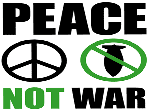 by Christianna Gozzi
by Christianna Gozzi
Anthropologist Douglas P. Fry debunks the commonly held belief that war is an inevitable force of human nature. Through his research of 87 internally-peaceful and 76 externally-peaceful societies around the globe, Fry makes a deeply compelling argument that war can be eradicated and peace maintained if society reorients itself on a few fronts. These include “enhancing crosscutting ties; recognizing interdependence; promoting new values, attitudes and beliefs; implementing overarching levels of governance; and expanding the use of conflict management mechanisms.” These factors must act in concert and require support at multiple levels of society.
Fry’s research demonstrates that humans are capable of many forms of conflict prevention, resolution and management—most of which are non- violent. War is merely one option amongst “avoidance, toleration, negotiation, and third party settlement procedures” and Fry argues that societies can and should shift focus so that third party conflict management is favored over violence and war.
This research also provides empirical support for the capacity of communities to shift from violent to non-violent forms of dispute resolution and give up war entirely. The Waorani bands, for example, chose to give up war when presented with an alternative reality—a life with the potential for peace and living without fear of violent death.
Conflict resolution practitioners can work to design conflict management procedures which are practical, efficient and usable at every level of society, thus increasing the probabilities that humans will chose a non-violent system over war.
Fry, D. (2006). The human potential for peace. Chapter, 20, Enhancing peace. Oxford, pp. 247-263